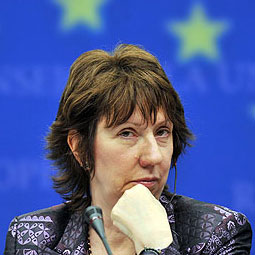Azerbaijan , Baku, March 5 /Trend T.Konyayeva/
European Union is still concerned about the treatment and fate of opposition leaders Mehdi Karroubi and Mir Hossein Moussavi, the High Representative of the Union for Foreign Affairs and Security Policy and Vice-President of the Commission, Catherine Ashton said in the official statement.
"I am still very concerned about the treatment of Mr Mehdi Karroubi and Mr Mir Hossein Moussavi," Ashton told. "It remains unclear - despite efforts of securing verifiable information - whether they are under house arrest or otherwise imprisoned."
In early February, opposition leaders Karroubi and Moussavi applied to the Interior Ministry for a permit to hold a rally on February 14 to express solidarity with pro-democracy movements in Tunisia and Egypt. The Ministry denied the permits, but hundreds of thousands of Iranians participated in peaceful demonstrations that were met with violence by security forces and plainclothes agents. Authorities have held Karroubi and Moussavi under house arrest for days and n o politician was able to leave the home to join demonstrators.
Later, opposition websites reported that two Iranian opposition leaders and their wives were transferred over the weekend to the Heshmatieh prison in Tehran.
Tehran's Prosecutor Abbas Jafari Dovlatabadi denied the opposition leaders' arrest and detention under house arrest, and said that this information is untrue.
Ashton urged that the authorities of the Islamic Republic of Iran simply to grant them the freedom of movement to which they have a right.
"I further condemn the unacceptable repression to which representatives of many political and civil society groups in Iran are now routinely subjected, and call on the Iranian authorities to respect the right to freedom of movement, and communication, of all those held in arbitrary detention or under house arrest," she told.
Ashton said that in conformity with its international obligations, notably those under the International Covenant on Civil and Political Rights which Iran has freely ratified, Iran has the same duty as every other state party to respect the fundamental rights of all its citizens.
On February 14, thousands of demonstrators came out in Tehran and other major Iranian cities - Isfahan, Shiraz, Kermanshah, and Gilan province. However, Iranian security forces suppressed demonstrations across the country, reportedly attacking crowds with tear gas, paint bullets, sticks, electric batons and live ammunition. There were reports that one demonstrator was killed.
There were clashes between demonstrators and plainclothes and Special Police Forces in those areas. Despite the widespread presence and reported use of force by plainclothes agents and anti-riot police, demonstrations continued acting at night.
To undercut the demonstration effort, security forces in major cities across Iran have reportedly detained numerous activists and demonstrators. Authorities allegedly detained two student activists, Mohsen Barzegar and Hossein Zamen Zarrabi, taking them to an unknown location.
Kaleme website also reports that on Feb. 14 evening, security forces stormed the homes of Ali Bagheri of the Islamic Mujahedin Organization's Central Council, and Abdollah Nasseri, another member of the organization and former head of the Islamic Republic News Agency during the Khatami administration, and detained them.
On Feb. 14, security forces surrounded the homes of several reformist politicians. Former President Mohammad Khatami and Abdollah Nouri, Interior Minister during Khatami's administration, were unable to leave their homes as forces surrounded them.






